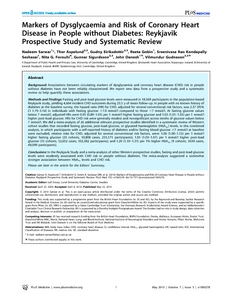Sarwar, N; Aspelund, T; Eiriksdottir, G; Gobin, R; Seshasai, SR; Forouhi, NG; Sigurdsson, G; Danesh, J; Gudnason, V
(2010)
Markers of dysglycaemia and risk of coronary heart disease in people without diabetes: Reykjavik prospective study and systematic review.
PLoS Medicine, 7 (5).
e1000278.
ISSN 1549-1676
https://doi.org/10.1371/journal.pmed.1000278
SGUL Authors: Kondapally Seshasai, Sreenivasa Rao
![[img]](https://openaccess.sgul.ac.uk/107219/1.hassmallThumbnailVersion/Markers_dysglycaemia.pdf)  Preview |
|
["document_typename_application/pdf; charset=binary" not defined]
Published Version
Download (266kB)
| Preview
|
Abstract
BACKGROUND: Associations between circulating markers of dysglycaemia and coronary heart disease (CHD) risk in people without diabetes have not been reliably characterised. We report new data from a prospective study and a systematic review to help quantify these associations.
METHODS AND FINDINGS: Fasting and post-load glucose levels were measured in 18,569 participants in the population-based Reykjavik study, yielding 4,664 incident CHD outcomes during 23.5 y of mean follow-up. In people with no known history of diabetes at the baseline survey, the hazard ratio (HR) for CHD, adjusted for several conventional risk factors, was 2.37 (95% CI 1.79-3.14) in individuals with fasting glucose > or = 7.0 mmol/l compared to those < 7 mmol/l. At fasting glucose values below 7 mmol/l, adjusted HRs were 0.95 (0.89-1.01) per 1 mmol/l higher fasting glucose and 1.03 (1.01-1.05) per 1 mmol/l higher post-load glucose. HRs for CHD risk were generally modest and nonsignificant across tenths of glucose values below 7 mmol/l. We did a meta-analysis of 26 additional relevant prospective studies identified in a systematic review of Western cohort studies that recorded fasting glucose, post-load glucose, or glycated haemoglobin (HbA(1c)) levels. In this combined analysis, in which participants with a self-reported history of diabetes and/or fasting blood glucose > or = 7 mmol/l at baseline were excluded, relative risks for CHD, adjusted for several conventional risk factors, were: 1.06 (1.00-1.12) per 1 mmol/l higher fasting glucose (23 cohorts, 10,808 cases, 255,171 participants); 1.05 (1.03-1.07) per 1 mmol/l higher post-load glucose (15 cohorts, 12,652 cases, 102,382 participants); and 1.20 (1.10-1.31) per 1% higher HbA(1c) (9 cohorts, 1639 cases, 49,099 participants).
CONCLUSIONS: In the Reykjavik Study and a meta-analysis of other Western prospective studies, fasting and post-load glucose levels were modestly associated with CHD risk in people without diabetes. The meta-analysis suggested a somewhat stronger association between HbA(1c) levels and CHD risk.
| Item Type: |
Article
|
| Additional Information: |
©2010 Sarwar et al. This is an open-access article distributed under the terms of the Creative Commons Attribution License, which permits unrestricted use, distribution, and reproduction in any medium, provided the original author and source are credited. |
| Keywords: |
Adult, Biological Markers, Blood Glucose, Coronary Disease, Diabetes Mellitus, Fasting, Female, Hemoglobin A, Glycosylated, Humans, Hyperglycemia, Male, Middle Aged, Prospective Studies, Reference Values, Risk Factors, Biological Markers, analysis, blood, General & Internal Medicine, 11 Medical And Health Sciences |
| SGUL Research Institute / Research Centre: |
Academic Structure > Molecular and Clinical Sciences Research Institute (MCS)
Academic Structure > Molecular and Clinical Sciences Research Institute (MCS) > Cardiac (INCCCA) |
| Journal or Publication Title: |
PLoS Medicine |
| ISSN: |
1549-1676 |
| Language: |
eng |
| Dates: |
| Date | Event |
|---|
| 25 May 2010 | Published |
|
| PubMed ID: |
20520805 |
| Web of Science ID: |
WOS:000278560500012 |
 |
Go to PubMed abstract |
| URI: |
https://openaccess.sgul.ac.uk/id/eprint/107219 |
| Publisher's version: |
https://doi.org/10.1371/journal.pmed.1000278 |
Statistics
Item downloaded times since 17 Feb 2015.
Actions (login required)
 |
Edit Item |



